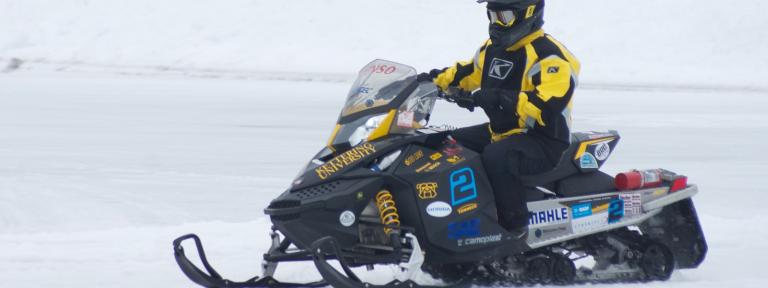
Kettering University’s Motorsports team earned second place in the 2012 SAE Clean Snowmobile Challenge, March 6-10 at Michigan Technological University – and it wasn’t easy.
The team faced a number of challenges with their modified Ski-Doo sled, including an engine failure on Friday before they were scheduled to leave for the competition on Sunday, March 5, installing a new engine in the eleventh hour and an electrical failure that cost them a day’s worth of competition points on Monday.
But the team persevered and managed to place second in the internal combustion category against 11 other teams. Kettering was one of the 12 teams registered in the internal combustion category while five teams competed in the zero emissions category for battery-powered sleds.
“We all should be proud of their efforts,” said Dr. Greg Davis, Kettering Motorsports Team-Clean Snowmobile crew adviser, “I received many great comments from the engineering judges about how impressed they were with our effort-and success.”
Davis explained that the engine failure posed a particular problem for the team because their sled is a new model and replacement parts are difficult to find. “After much searching we found that we would not even be able to get the engine parts until Tuesday,” he said, “Luckily, we found a used trail snowmobile with our engine in Houghton.”
Davis bought the used snowmobile Sunday morning and the team arrived that afternoon. They quickly removed the engine and transferred it to their competition sled by Sunday evening. “All was looking great,” said Davis, “but they then suffered an electrical problem which caused them to miss the first day of competition events, losing an opportunity to gain a lot of points. However, they did not give up and they managed to pull it all together, finishing strong for the rest of the challenge, placing a close second place!”
The Clean Snowmobile Challenge is the newest collegiate design competition of the Society of Automotive Engineers. Engineering students from participating schools reengineer a stock snowmobile to reduce emissions and noise and increase fuel efficiency, all while preserving the riding excitement demanded by snowmobile enthusiasts.
Johannes Haas, a department head at the University of Applied Sciences, in Gratz, Austria, traveled to Houghton to experience the Challenge and how participants apply what they’ve learned in the classroom to real-world engineering. “This is a fabulous place for learning,” he said.
Fuel economy was a top priority in this year’s Challenge. Sleds in the internal combustion category had to adapt to fuels with a range of ethanol concentrations, from E10 (10 percent) to E39 (39 percent). Fuel economy was measured in three ways. During the Endurance Run, teams were rated in part on their snowmobiles’ mileage during the 100-mile trek. Fuel usage was also be measured during the indoor emissions testing. Lastly, the Challenge included a mobile emissions test that incorporated a fuel flow meter.
Sponsored by the National Science Foundation, the Clean Snowmobile Challenge also received support from the USDA Forest Service; the National Park Service; automotive parts supplier DENSO; Emitec Inc., a supplier of emissions-reduction technology; Phoenix International, a John Deere company; Aristo Catalyst Technology; Mahle; and Gage Products, which is providing fuel. A new sponsor is Camoplast. The Sherbrooke, Quebec-based company is a global leader in rubber-track technology.
The Clean Snowmobile Challenge is sponsored at Michigan Tech by the Keweenaw Research Center and the Department of Mechanical Engineering-Engineering Mechanics.